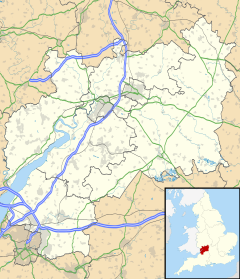Human settlement in England
| Daylesford | |
|---|---|
 St Peter’s Church St Peter’s Church | |
 | |
| OS grid reference | SP243259 |
| Civil parish | |
| District | |
| Shire county | |
| Region | |
| Country | England |
| Sovereign state | United Kingdom |
| Post town | MORETON-IN-MARSH |
| Postcode district | GL56 |
| Dialling code | 01451 |
| Police | Gloucestershire |
| Fire | Gloucestershire |
| Ambulance | South Western |
| UK Parliament | |
| |
Daylesford is a small, privately owned village and former civil parish, now in the parish of Adlestrop, in the Cotswold district, in the county of Gloucestershire, England, on the border with Oxfordshire. It is situated just south of the A436 two miles east of Stow-on-the-Wold and five miles west of Chipping Norton. The village is on the north bank of the small River Evenlode. This area falls within the Cotswold Hills Area of Outstanding Natural Beauty, so designated in 1966. In 1931 the parish had a population of 82.
History
See also: History of Worcestershire and History of GloucestershireIn the medieval period the manor was held by the Hastings family. Until 1931 Daylesford was a detached part of Worcestershire, but in that year it was transferred to Gloucestershire. It was a separate civil parish until 1 April 1935, when it was absorbed into the civil parish of Adlestrop.
Daylesford House
Main article: Daylesford HouseIn 1788, Daylesford House was acquired by Warren Hastings, Governor-General of India, a descendant of its medieval owners. In the following years, he remodelled the mansion to the designs of Samuel Pepys Cockerell, modelling it on the grand house he had built at Alipore in India. The interior was replete with magnificent classical and Indian decoration (a style later developed successfully at Sezincote House nearby), with much use of silver and crimson. The drawing room and library had furniture made out of ivory brought back from India The gardens were landscaped by John Davenport (fl. 1774).
Warren Hastings also rebuilt the Norman Church of St Peter in 1816, where he was buried two years later. The church was again rebuilt to the designs of J. L. Pearson in 1859-63. It is a Grade I Listed Building, having been designated as such on 25 August 1960.
During the 20th century, the house and estate were the property of Charles Edward Baring Young, and then Viscount Rothermere, who restored the house with the help of the interior decorator John Fowler, and Baron Heinrich Thyssen. It is currently the Gloucestershire home of Lord Bamford and Lady Bamford, major shareholders in the JCB excavator company, and significant donors to the Conservative Party. The Earl of Snowdon and his family rent a cottage on the estate.
The lakeside gardens with wooded walks and unusual trees and shrubs are occasionally open to the public in the summer months. There is a farm shop on the estate, which sells organic food under the Daylesford Organic brand.
References
- Concise Road Atlas of Britain. AA Publishing. 2016. p. 30. ISBN 978-0-7495-7743-8.
- "AONB". Cotswolds AONB. Archived from the original on 4 August 2014. Retrieved 29 August 2016.
- "Population statistics Daylesford CP/AP through time". A Vision of Britain through Time. Retrieved 15 December 2022.
- "Relationships and changes Daylesford CP/AP through time". A Vision of Britain through Time. Retrieved 15 December 2022.
- Christopher Christie (2000). The British Country House in the Eighteenth Century. Manchester University Press. p. 81. ISBN 978-0-7190-4725-1.
- "Daylesford House, Moreton-In-Marsh". Parks & Gardens, UK. Archived from the original on 10 September 2016. Retrieved 29 August 2016.
- "Church of St Peter, Adlestrop". British Listed Buildings. Retrieved 29 August 2016.
- Tyzack, Anna (24 November 2011). "My perfect weekend: David Linley". Daily Telegraph. Retrieved 27 October 2015.
- "Daylesford Organic website". Archived from the original on 23 July 2008. Retrieved 28 July 2009.
External links
- 'Parishes: Daylesford', A History of the County of Worcester: volume 3 (1913) British History Online
- Nicholas Mander, Country Houses of the Cotswolds (Aurum Press, 2008)